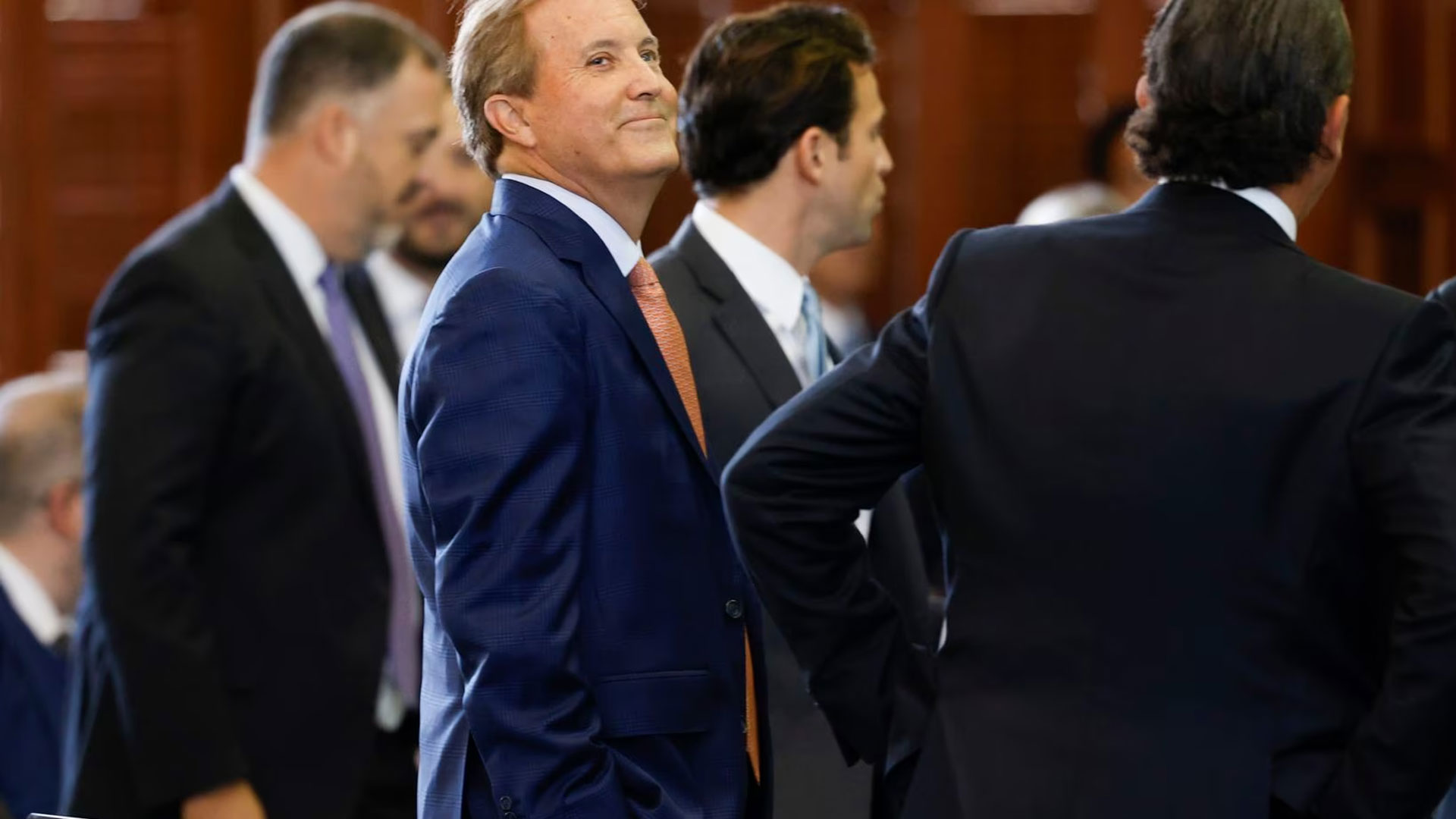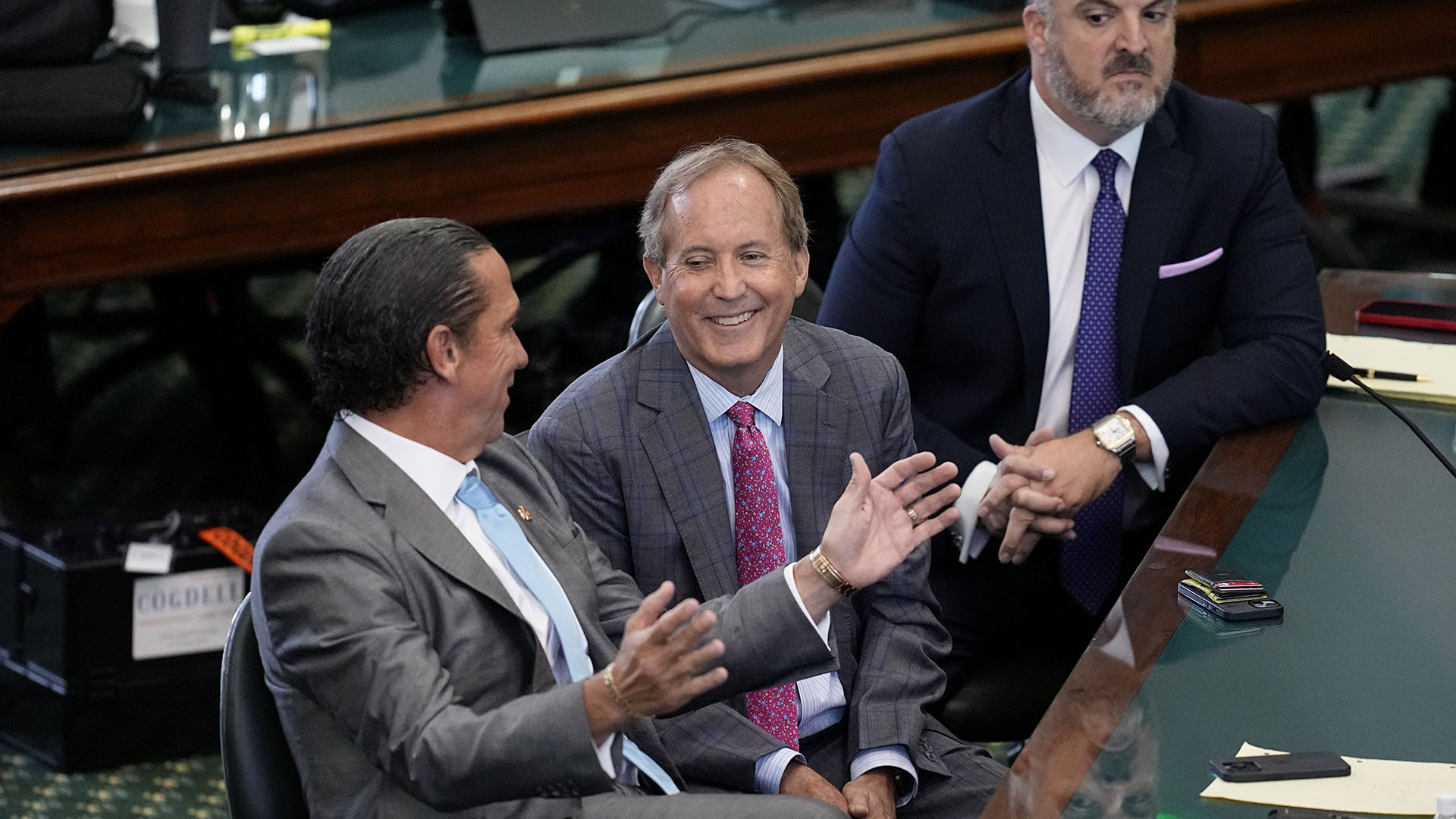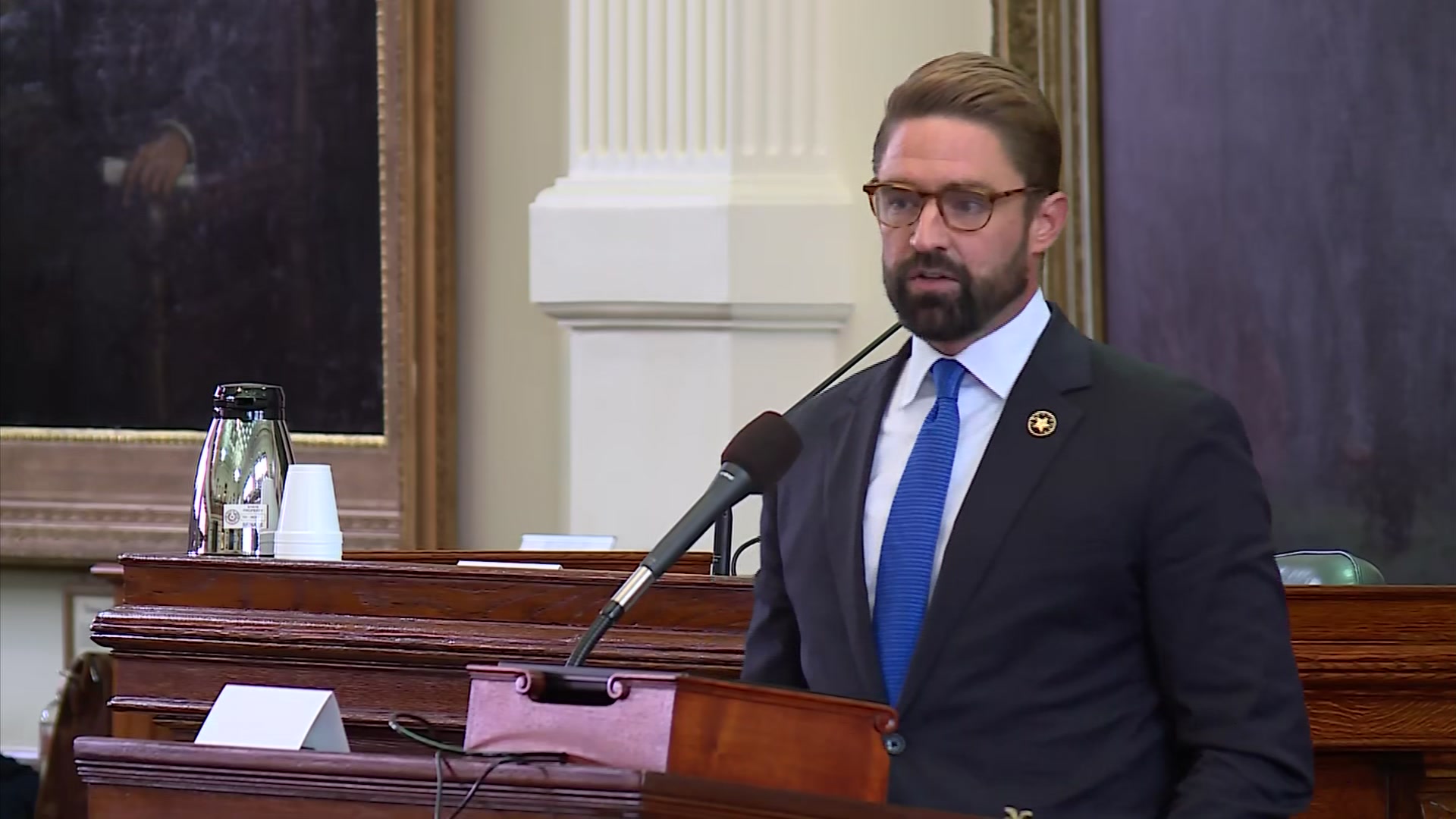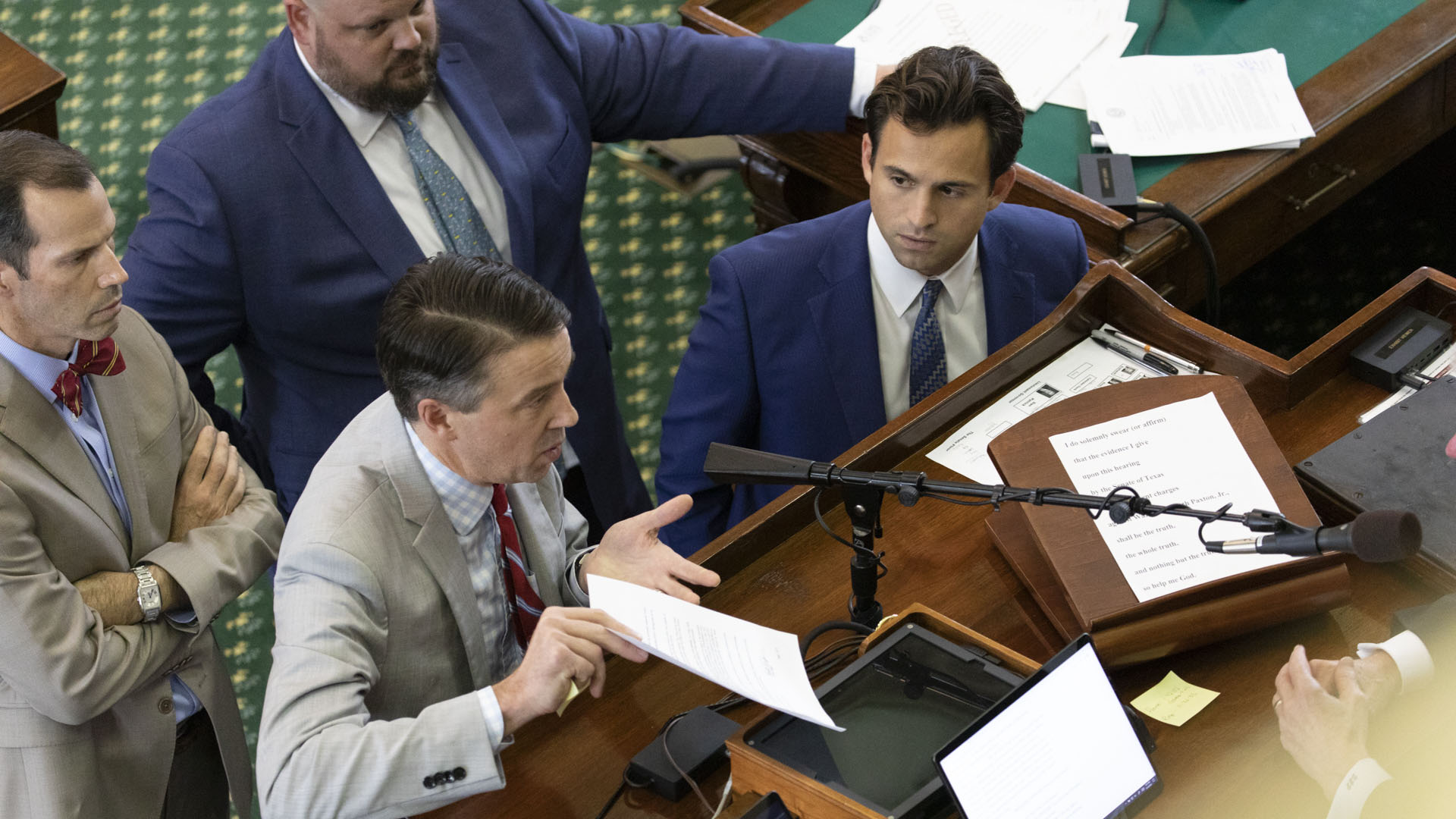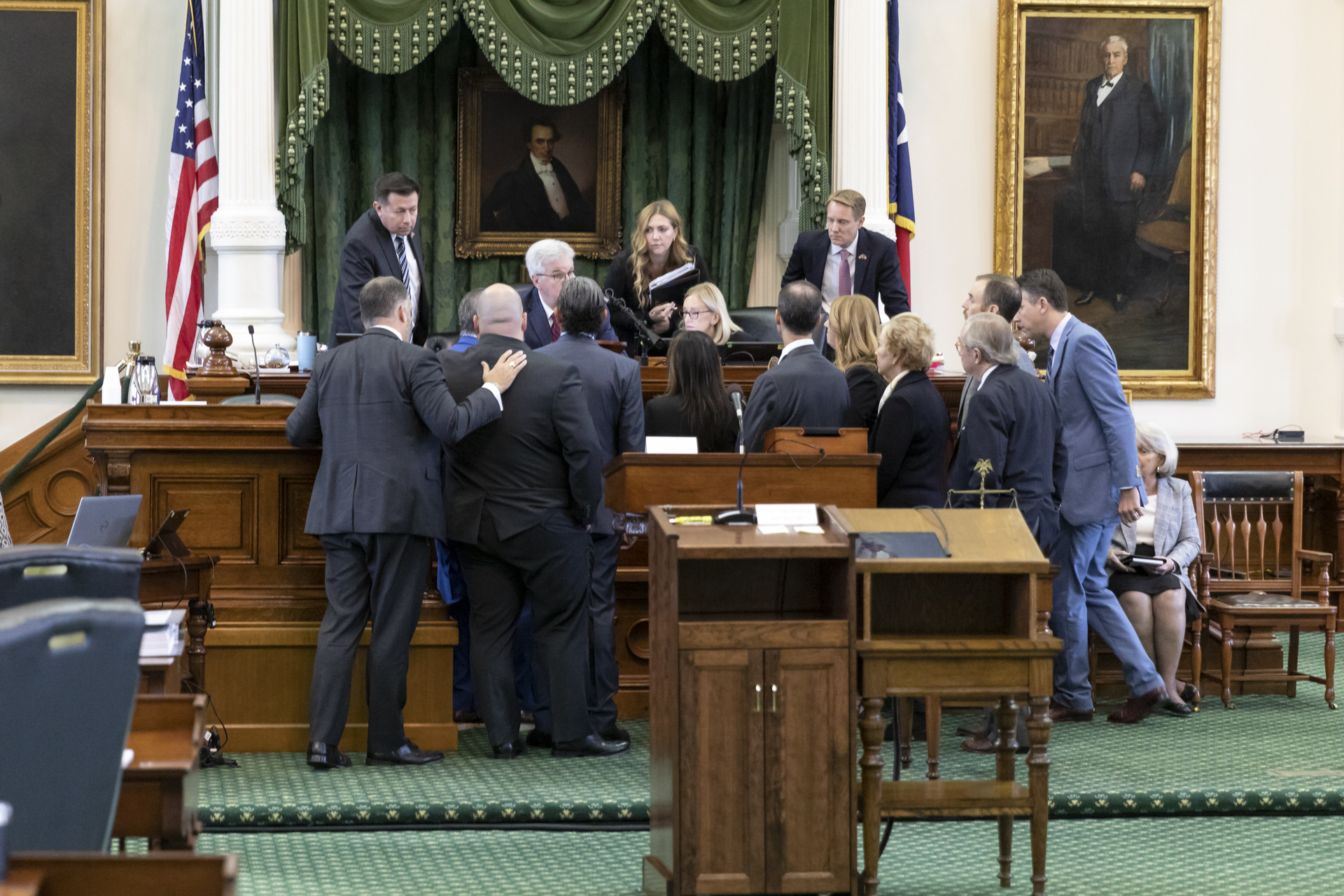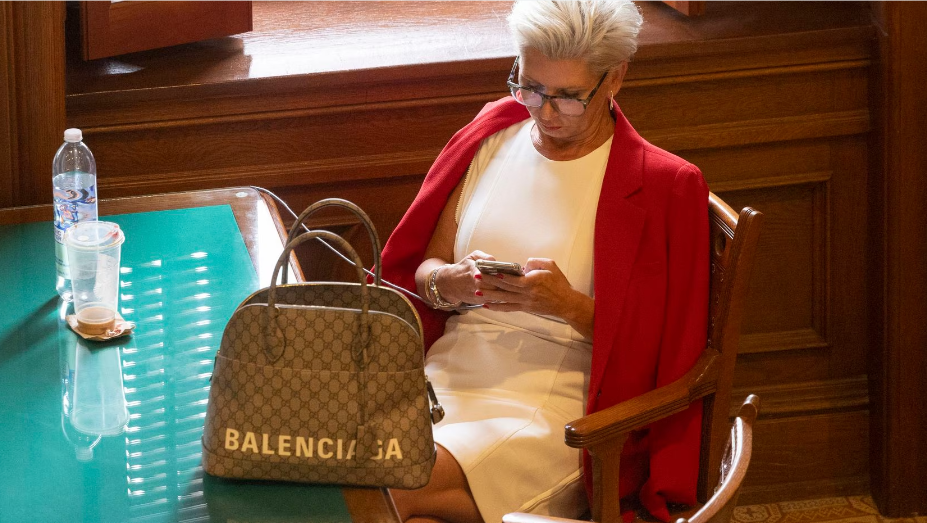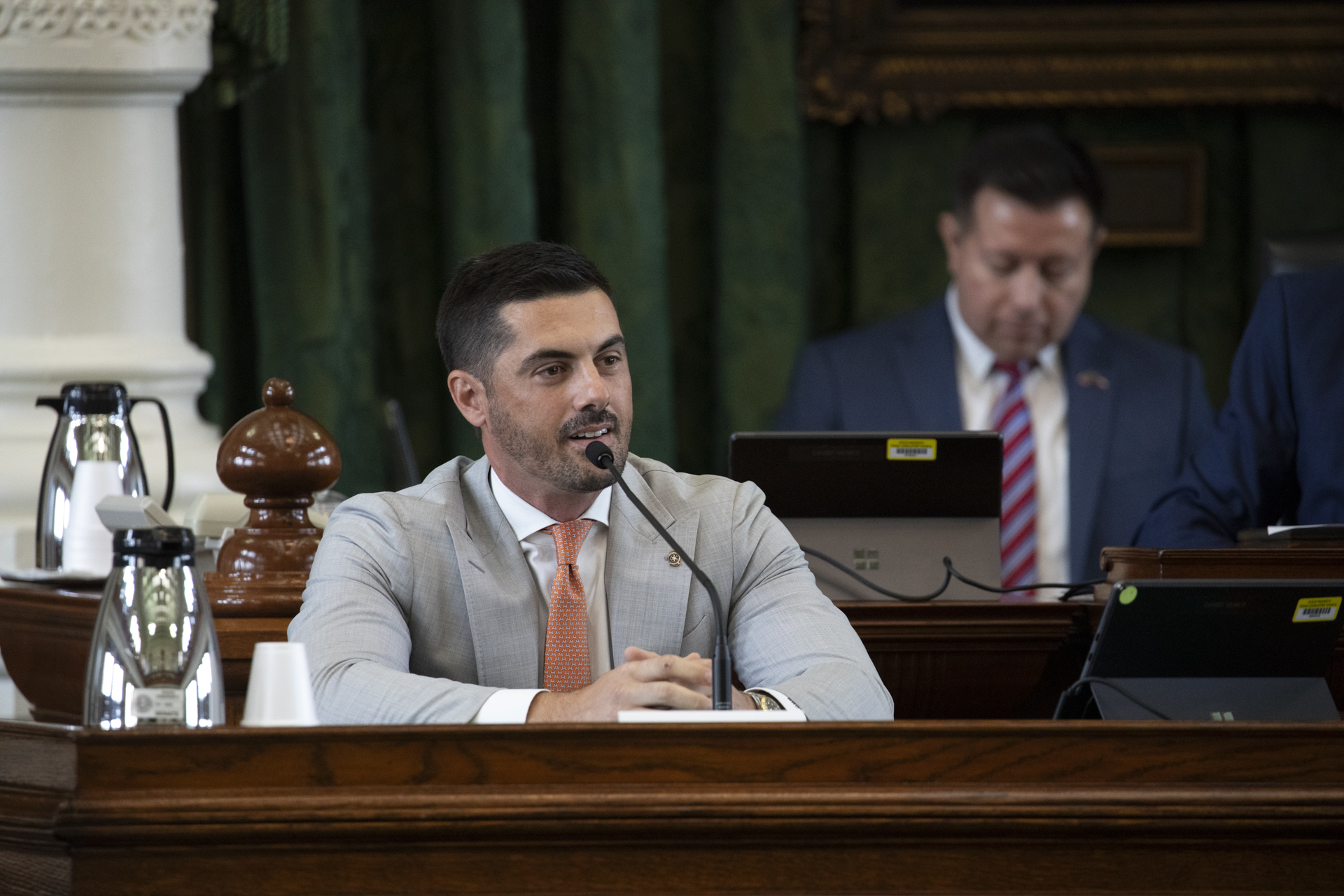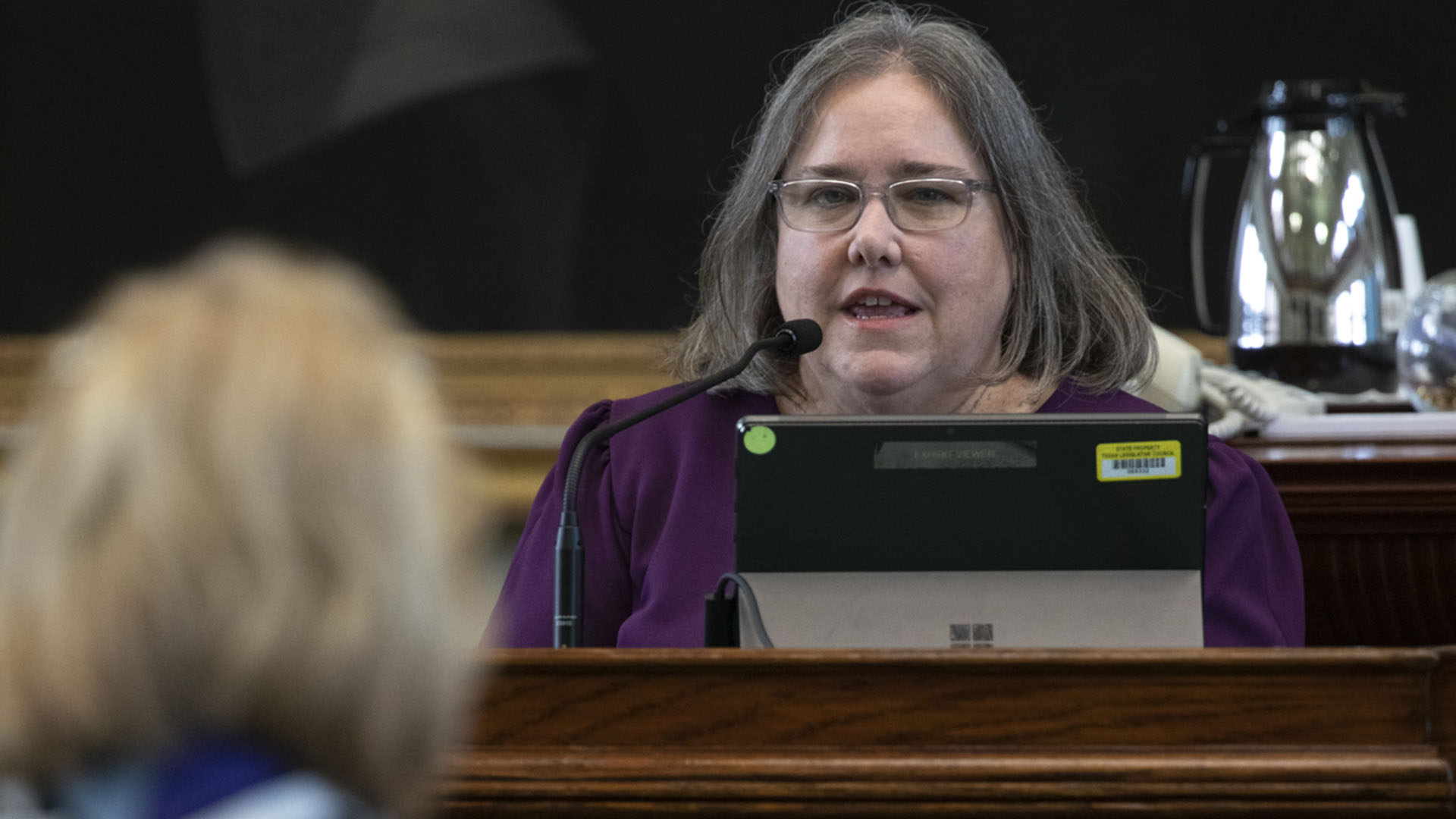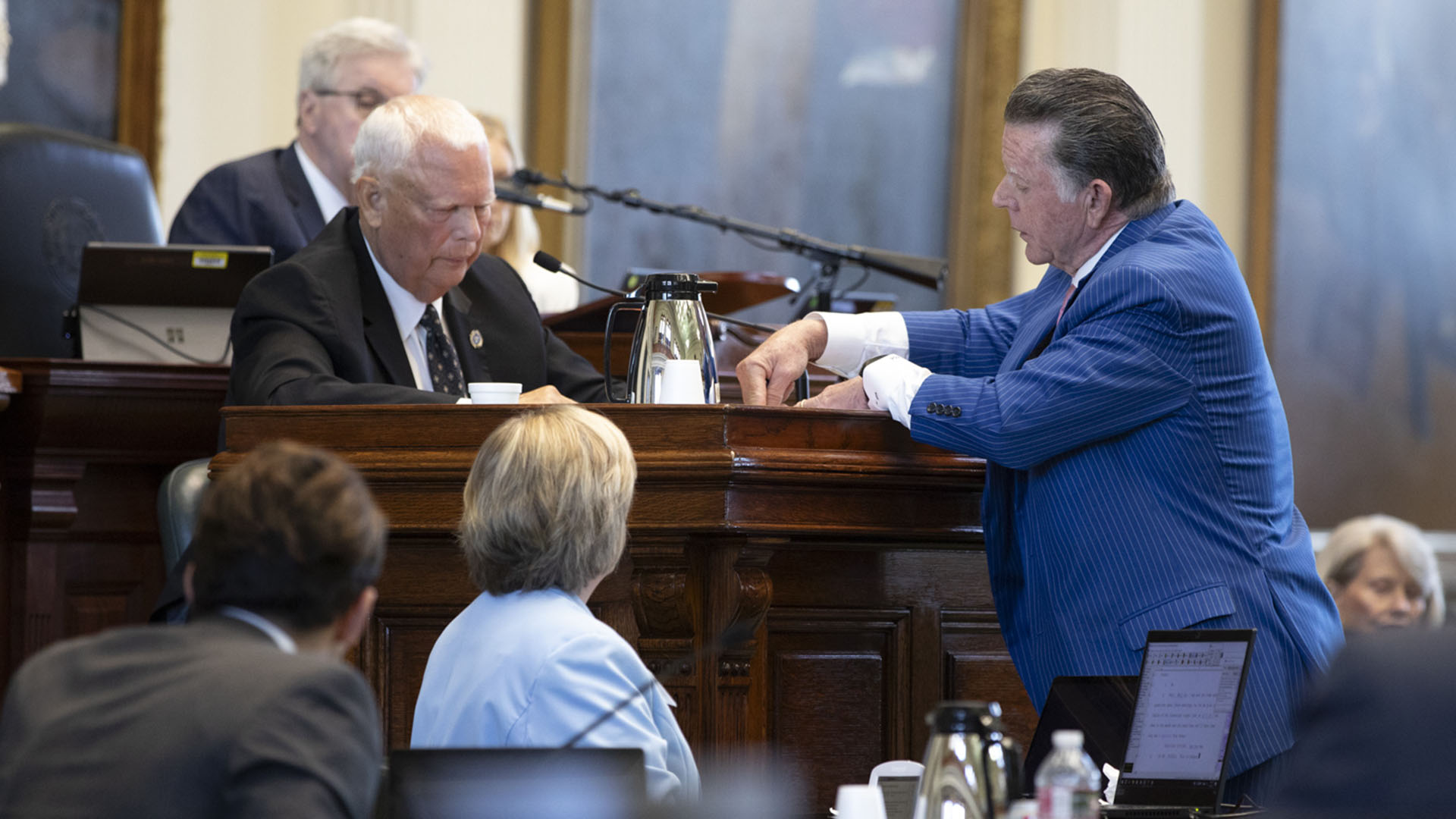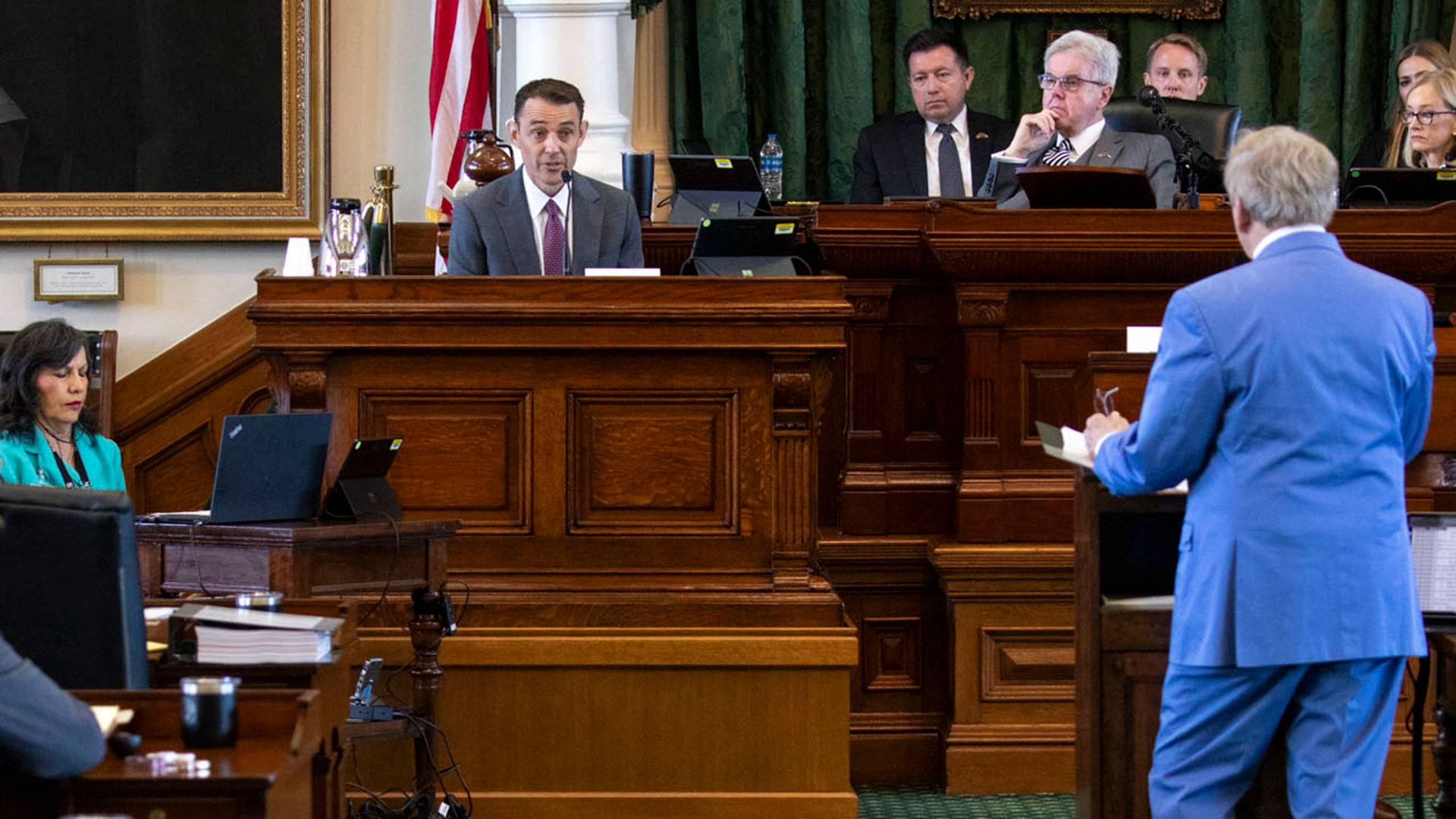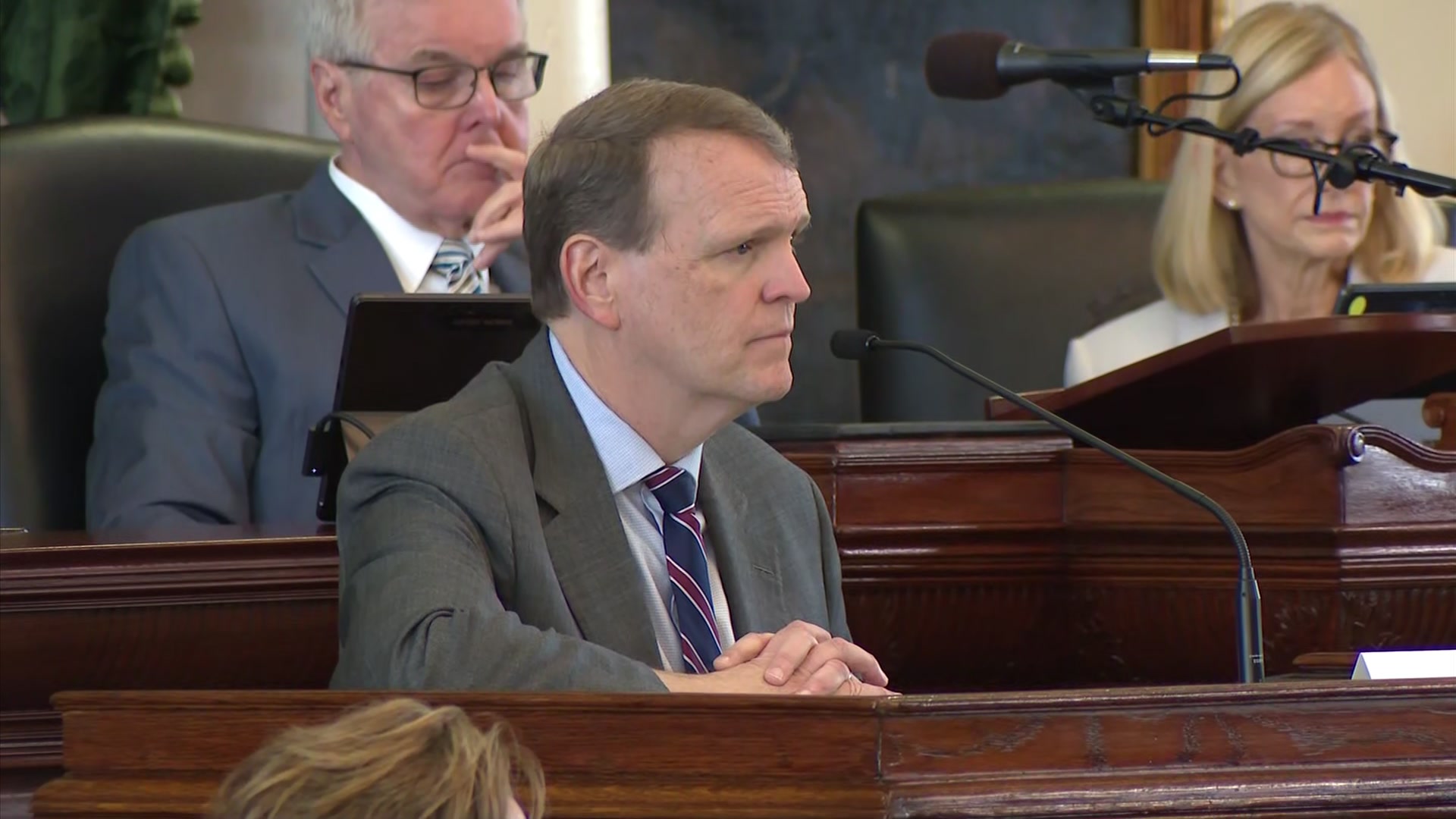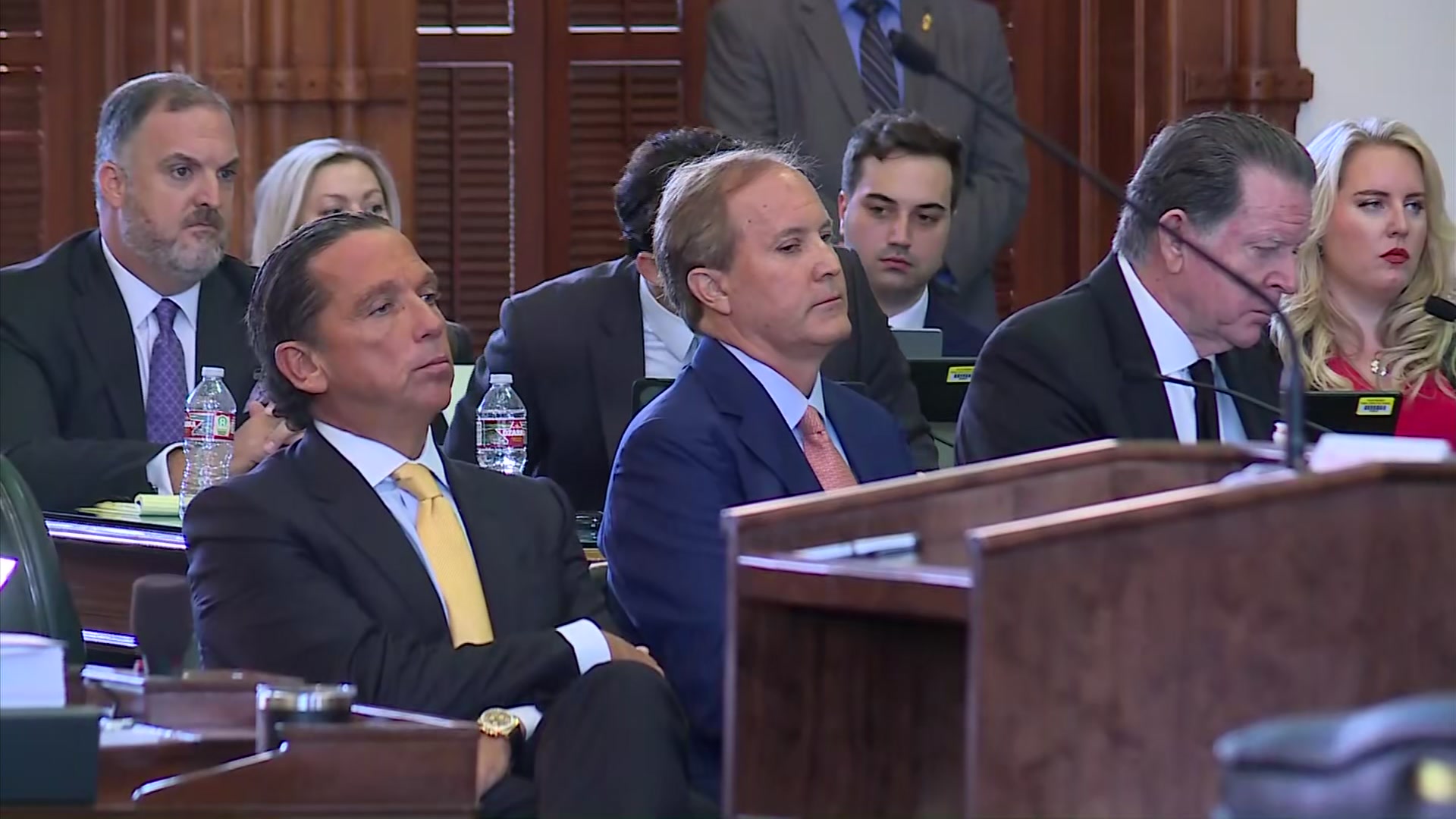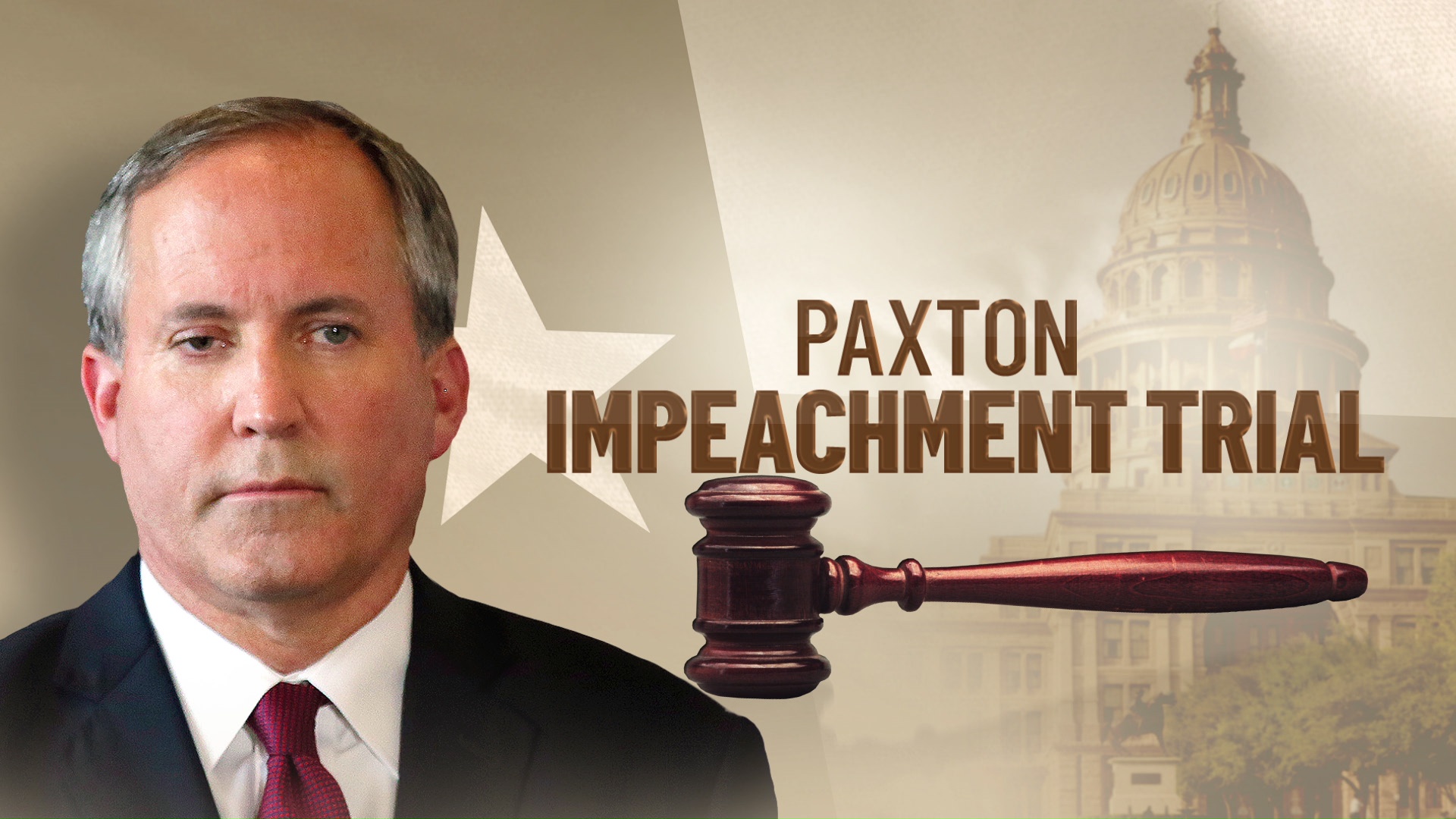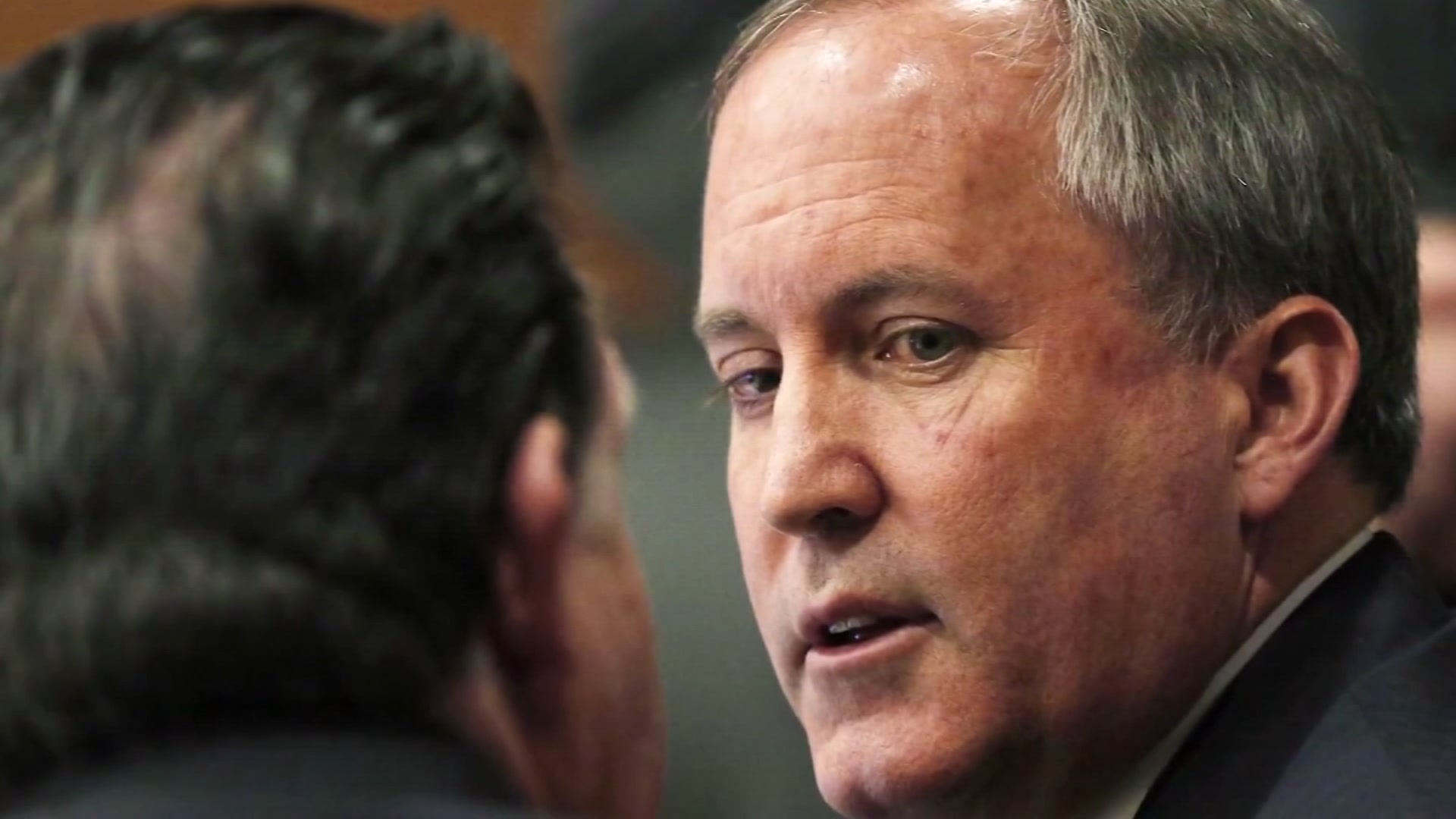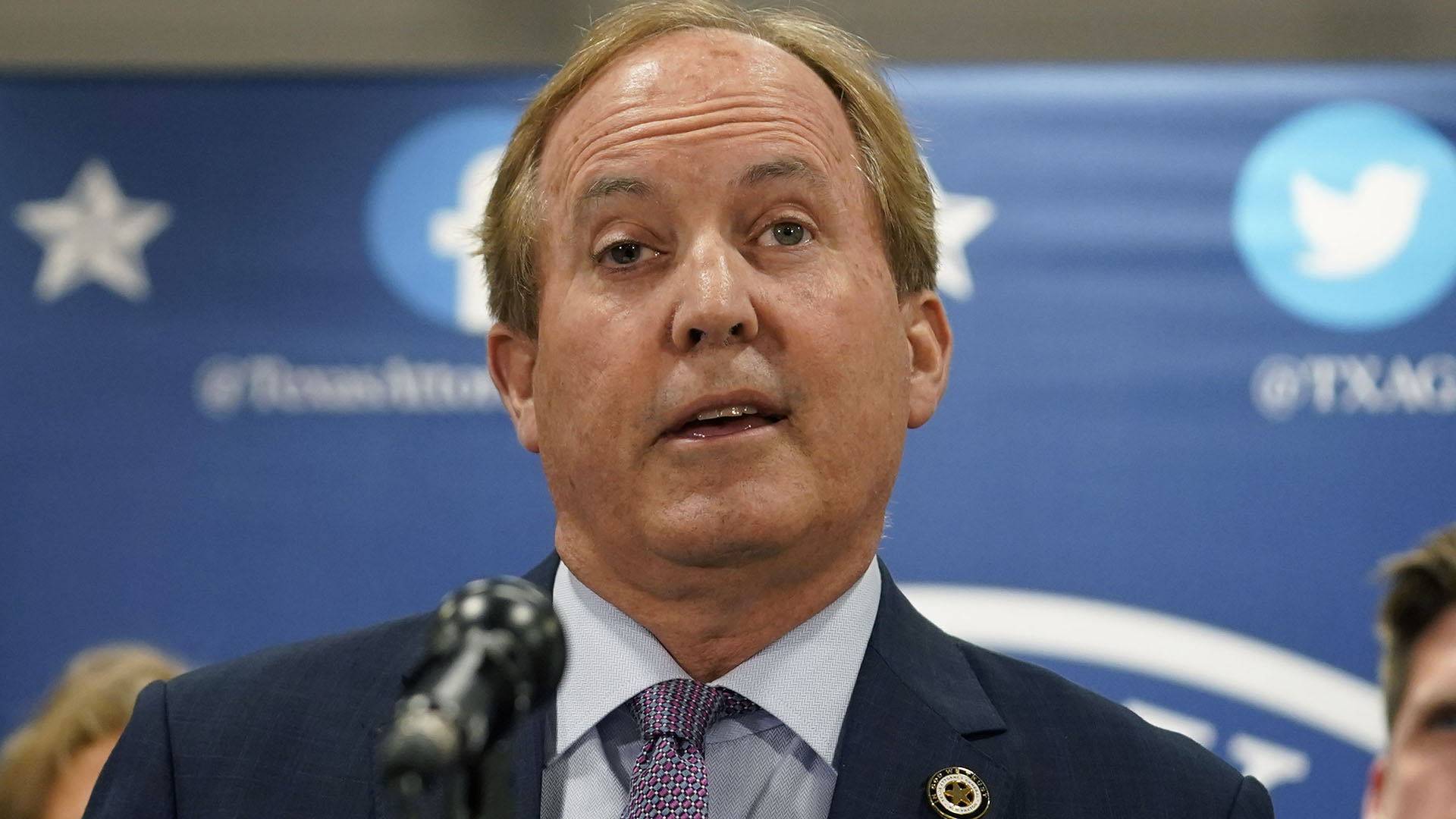There was emotional testimony from two key whistleblowers during the third day of Ken Paxton's impeachment trial in Austin on Thursday.
The suspended attorney general was absent again from the proceedings and has never returned since leaving the capitol building after pleading not guilty to 16 articles of impeachment on Tuesday that cover allegations from bribery to misuse of the office.
Paxton's defense attorney, Tony Buzbee, was also not present at the hearing Thursday.
Both men who testified Thursday, Ryan Bangert and Ryan Vasser, said they were loyal employees who were asked to do unethical things.
Get DFW local news, weather forecasts and entertainment stories to your inbox. Sign up for NBC DFW newsletters.
"I worked for the state for eight years as a public servant," Vasser said, holding back tears. "As one who values the commitment to public service to set an example for my kids, the people that I worked with, the people that I managed. It's contrary, the statement of being rogue is contrary to the years that I dedicated my life to the state."
Vasser is one of the whistleblowers who sued Paxton.
Former assistant attorney general Ryan Bangert did not sue. He spent most of the day describing what he considered to be unethical things he was asked to do by Paxton on behalf of businessman Nate Paul in 2020.
"I went to the FBI because I believed based on my experience over the past nine months that the attorney general had abandoned his obligation to work on behalf of the interests of the people of Texas to serve one person, Nate Paul," Bangert said.
Bangert said all of those other things came at the expense of what they should have been doing.
One of the articles of impeachment claimed employees were punished for going to the FBI, but Bangert's testimony did not support that claim. He said he did not lose his title, was never suspended and that Paxton visited his office on his last day.
Vasser, who does have a lawsuit against Paxton, said he was fired from the attorney general's office on Nov. 17, 2020, for disclosing confidential information outside the agency. Vasser said the OAG did not disclose what that information was and when he asked there was no response.
Vasser said he is part of a lawsuit suing the attorney general. He said he's doing it to provide for his family and to be a good example for his children.
DAY 3 UPDATES
6:48 p.m., Patrick adjourned for the day. The court will convene at 9 a.m. Friday morning.
5:55 p.m., Vasser said he was never involved in the Mitte Foundation case and had no knowledge of their investments.
5:53 p.m., Little asks Vasser about letterhead that went out without Ken Paxton's name at the top. Vasser said the agency had different letterhead available that does not have the general's name on it.
5:46 p.m., Little peppers Vasser with questions about going to the FBI with no physical evidence and why he didn't feel like he at least owed Ken Paxton a phone call before going to federal investigators. Vasser said he didn't think he owed him anything and that the whistleblowers felt like they had evidence with their good faith belief that a crime had been committed.
5:34 p.m., Little asked Vasser, "At what point in time did you come back to the FBI and say, 'Well, maybe there was some authority for Brandon Cammack to do what he was doing. Did you ever do that?" Vasser replied, "No, sir."
5:32 p.m., Little asked if Vasser and the other whistleblowers went back to the FBI to clarify their statement about the subpoenas being served after learning that Cammack had a signed contract with the attorney general.
5:31 p.m., Vasser said they provided no documents to the FBI during the Sept. 30 meeting.
5:29 p.m., Vasser said when he went to the FBI he had no direct knowledge of who paid for the renovations to the Paxton's home. He said it had been discussed on Sept. 29 among the deputies before they went to the FBI. Little said one of the things told to the FBI, during a roundtable discussion with all of the deputies, was that they were concerned someone else was paying for the home renovations.
5:28 p.m., Defense attorney Mitch Little began cross-examination of Ryan Vasser.
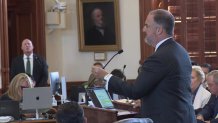
5:03 p.m., Vasser passed the witness for cross-examination and Patrick called a 20-minute recess.
5:01 p.m., Vasser said he is part of a lawsuit suing the attorney general. He said he's doing it to provide for his family and to be a good example for his children.
4:59 p.m., Vasser said he was terminated from the OAG on Nov. 17, 2020, for disclosing confidential information outside the agency. The OAG did not disclose what that information was and when he asked there was no response.
4:56 p.m., Vasser said, "It became clear at that point that the degree and extent to which General Paxton appeared to be using the office to benefit a single private individual, to target and harass law enforcement, rose to a level that, based on our good faith belief, criminal activity had occurred. And under no circumstances, did Brandon Cammack have any authority, either under a contract that was unsigned or a contract that was signed, or by some deputation by Travis County District Attorney's Office to serve as a special prosecutor for the Office of the Attorney General. So, he was representing himself in a capacity that did not exist and doing so for the benefit of a single individual."
4:54 p.m., Vasser said his decision to go to the FBI was because he believed Paxton was abusing his power.
"I formed a conclusion that based on my good faith belief that General Paxton was using the power and authority of his office to benefit a private individual," said Vasser.
4:49 p.m., Vasser testified that on Sept. 30 he and the other whistleblowers spoke to the FBI. He said on Oct. 1 they notified Paxton they had talked with the FBI. Vasser says two letters were sent to Cammack by Mark Penley and Jeff Mateer on Sept. 30 and Oct. 1 and that Penley moved to quash the subpoenas served by Cammack. On Oct. 2, Vasser said Paxton informed him he'd signed a contract with Cammack and that Mateer's letter telling Cammack to cease and desist was improperly sent.
4:47 p.m., Vasser said Cammack could only identify himself as an authority of the OAG when he had a binding, executed contract. Vasser said on Oct. 2 Cammack sent a contract that appeared to be signed by himself and Paxton. Vasser said Paxton later told him he'd signed the contract with Cammack.
4:45 p.m., Vasser said after the internal approval process had started for Cammack, he called and asked if there were any official documents or an official email address that they would provide him with. Vasser said no official documents or credentials were provided to him.
4:39 p.m., Vasser said his role was to recommend if the agency had lawful authority to act, not whether it should act, and he said in his review Cammack, as outside counsel, could provide legal services to the agency to review the complaint referred by Travis County.
4:27 p.m., Vasser said the contract he wrote for Cammack authorized him to review the allegations in the complaint in the Travis County referral and prepare a report for Paxton about that complaint. Vasser said he told Paxton the agency cannot ordinarily engage in a criminal case unless that have a referral, but that even under a referral they wouldn't have an outside counsel represent the OAG in a prosecutorial role.
4:22 p.m., Vasser said he was asked by Paxton about the procedure for putting together a contract for outside counsel, for Brandon Cammack and Joe Brown. Vasser said he ultimately only put together one contract for Cammack.
4:19 p.m., Hardin begins asking about a contract for Brandon Cammack, who Vasser said was being hired as a second set of eyes for the Travis County referral involving Nate Paul. Vasser said he first saw the referral on Sept. 3
4:14 p.m., Vasser is asked about Protonmail, an encrypted end-to-end email service that was used by Ken Paxton. The defense said previously the attorney general used the service to protect communications on a trip to China. Vasser said he was asked to send the draft to Paxton's Protonmail address.
4:08 p.m., Vasser said foreclosure sales are held on the first Tuesday of each month and that the opinion was released at about 1 a.m. Sunday.
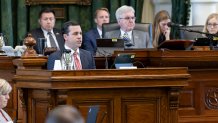
At 4:06 p.m., Vasser said he knew that Bangert and Paxton were talking as the opinion drafts were being written. He said he was not involved in any direct conversations about the opinion with the attorney general as they worked on the draft.
4:05 p.m., Vasser said he and Bangert were both deputies and that it was unusual that they would write opinions. He said he thought they were tasked with it because Paxton wanted it done quickly.
4:04 p.m., Vasser said Bangert called him back after talking with the attorney general who said they "had got the wrong answer." Vasser said he laughed because he thought he'd had the right answer based on the office's precedent over the summer.
4:01 p.m., Vasser said on Friday, July 31, 2020, Bangert contacted him about a request from the attorney general about a foreclosure opinion around foreclosure sales. He said he'd have a draft to him that night or the next morning. He said Bangert agreed with the draft that foreclosure sales should be able to proceed based on the current executive order from Gov. Abbott and the office's policy of reopening the state.
3:58 p.m., Vasser said information released in an open records request is released without conditions.
3:41 p.m., Vasser said the FBI brief contained details for the raid, task force members, and a probable cause affidavit filed under seal in a federal court.
3:38 p.m., Hardin asked what was the significance of taking no position. Vasser said it was semantics, but gave the impression the office wasn't taking the side of the DPS or FBI.
3:35 p.m., Vasser said they ultimately directed to take a position of no position. They were not making a ruling either way. Vasser said he'd never participated in that kind of ruling before and was unaware of it happening before regarding open records.
3:33 p.m., Court resumed.
3:10 p.m., Patrick called a 20-minute recess.
3:09 p.m., Vasser said he and Bangert met with Paxton days later, toward the end of May, and let him know they didn't think they could reach an alternative conclusion.
3 p.m., Vasser said despite their objections, Paxton still insisted that Paul had been wronged and again voiced his distrust of law enforcement.
2:58 p.m., Vasser said he told Paxton that if they were to reach the opposite conclusion and require the DPS to release the information it would upset decades of precedent involving the law enforcement privilege and could compromise law enforcement positions and investigations.
2:57 p.m., Vasser said he met with the attorney general about the file and that Paxton asked what their interpretation was. Vasser said Paxton told them he spoke personally with Paul and believed something bad had happened to him and that he was being railroaded by the FBI and DPS. He said Paxton said he didn't trust law enforcement and asked them to find a way to release the information that had been requested to be withheld.
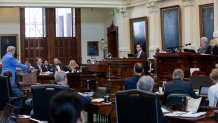
2:53 p.m., Vasser said he reviewed the file and set a time to meet with Paxton to discuss the file. He said it was a straightforward ruling that the information should not be released due to the law enforcement exception.
2:51 p.m., Vasser said it was his understanding that Paxton had met personally with Nate Paul and considered what had happened to him to be wrong and wanted his staff to find a way to help him. Vasser said he had in-person conversations with Paxton about Paul beginning in May 2020 about the August 2019 raid of Nate Paul's home and businesses.
2:50 p.m., Vasser describes the open records request process regarding law enforcement. He said the Texas DPS had received a request for public information. Under the Public Information Act, agencies that wish to withhold that information have to ask for a ruling from the attorney general's ruling within 10 days. The DPS asked if it could withhold information under the law enforcement exception due to information in the request that was not required to be disclosed and it was up to the AG's office to determine if it can be withheld.
2:47 p.m., Vasser said he viewed his duty as being responsible for providing legal advice for the agency through the various functions of the divisions. When he heard he was being referred to as a "rogue employee" he said it was hurtful.
"I worked for the state for eight years as a public servant. As one who values the commitment to public service to set an example for my kids, the people that I worked with, the people that I managed. It's contrary, the statement of being rogue, is contrary to the years that I dedicated my life to the state.," Vasser said, holding back tears.
2:46 p.m., Vasser said Jeff Mateer was a role model and a good leader and that they were both religious men.
2:46 p.m., He said he first heard the name of Nate Paul in May 2020 due to a pending open records request.
2:45 p.m., Vasser said the deputy for general and legal counsel oversees the opinion writing process, open records division, public finance division, and the general counsel division.
2:43 p.m., Vasser said the first time he'd heard of Nate Paul was in May 2020. At this time he said he'd have weekly individual meetings with Mateer and Bangert.
2:42 p.m., In April 2020, Vasser said he was promoted to deputy attorney general for legal counsel and moved up to the eighth floor where most of the executive staff worked.
2:40 p.m., Vasser said during the first few years of his work 4with the attorney general's office he had no substantive contact with Ken Paxton. Other than a periodic office gathering, he was not around the general safety.
2:34 p.m., Ryan Vasser is introduced. He described himself as a 39-year-old married father of four from Big Spring, Texas. Vasser said he was unemployed as a lawyer for six months after leaving the attorney general's office. He graduated from Texas Tech as an accountant and later went to work for a law firm in Dallas before going to law school and graduating in 2011. Vassar worked under Paxton for several years before he was fired in November 2020 when he was the deputy attorney general for legal counsel. Previously Vassar worked for former Gov. Rick Perry and former Texas Supreme Court Justice Don Willett.
2:32 p.m., Bangert concluded his testimony and the prosecution called witness Ryan Vasser.
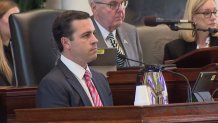
2:31 p.m., Osso asked Bangert if he had ever practiced real estate law. Bangert said he had not. Osso said Paxton had a background in real estate law and said he perhaps had some background on settlement services. Bangert replied, "In this case that was not the best interpretation."
Osso to Bangert: That's your opinion, sir, correct?
Bangert to Osso: No, that's the law.
Osso to Bangert: That's your opinion.
Bangert to Osso: I disagree.
2:30 p.m., Osso questioned Bangert about "settlement services" and whether the opinion had been challenged in court and he didn't see how it could have been under standing doctrine.
2:27 p.m., Hardin passed the witness back to Osso for recross.
2:27 p.m., Bangert said it was only through news reports that he became aware of how Nate Paul cited the opinion in litigation and that he wasn't aware of how judges ruled in those cases.
2:21 p.m., Bangert talks about how they changed their drafts of the opinion at the direction of the attorney general and said at the time he had no specific knowledge of any foreclosure sales.
2:15 p.m., The defense did not object to the document and it's being admitted into evidence.
2:07 p.m. A 5-minute recess is called to allow the defense to look over a document.
2:02 p.m., Bangert said the decision on the opinion was a straightforward reading of the governor's statute. Bangert was asked how he was able to change the opinion, he said, "We determined based on the attorney general's instruction to us that we would no longer apply the exception that had been granted by the governor's order. He told us to reach a different conclusion and that was the only way to do it."
1:50 p.m., Bangert said the legal basis for the opinion on no restrictions to outdoor foreclosure sales was a number of exceptions written into the governor's order around in-person gatherings.
1:49 p.m. Hardin points to a section of the draft: "We conclude that a foreclosure sale of residential or commercial real property constitutes a service to which no occupancy limit applies, under executive order GA-28 and local governmental bodies therefore lack authority to restrict in-person attendance at these sales."
1:47 p.m., Rusty Hardin begins redirect and asks Bangert if the draft in evidence was the original draft presented to the attorney general on Saturday afternoon. After reading the document, Bangert said it was one of the early drafts of the non-judicial foreclosure opinion.
1:45 p.m., Osso passed the witness back to the prosecution for redirect.
1:44 p.m., Osso asked Bangert what was missing from the letterhead on the document? Bangert said the attorney general's office seal was present and Osso noted that Ken Paxton's name was missing. Bangert said Paxton's name did appear in the content of the letter.
1:42 p.m., Bangert agreed that he and Jeff Mateer were in agreement on Oct. 1 to terminate Brandon Cammack's employment by letter.
1:40 p.m., Reading Article V of the articles of impeachment, Osso said "Paxton misused his official powers by violating the laws governing the appointment of prosecuting attorney pro tem." Osso asked Bangert if Brandon Cammack was an attorney pro tem. Bangert said it was difficult to classify what Cammack was and then said, "I don't personally believe he was properly ever appointed a prosecutor pro tem."
1:36 p.m., Osso asserts Bangert went behind Ken Paxton's back when they went to the FBI and ordered him to answer yes or no if they told the attorney general they were going to the FBI before the Sept. 30 meeting with federal investigators. Bangert said that was not a yes or no question before saying, "I did not tell Ken Paxton before I went to the FBI."
1:29 p.m., Osso asked about Bangert's working with Johnny Sutton. Osso showed him a document that showed he searched for the Ashcroft Law Firm on Sept. 22, 2020, eight days before the whistleblowers went to the FBI. Osso asserted Bangert was looking for an attorney before he knew Cammack was issuing subpoenas at the banks, and Bangert said that was a coincidence.
1:26 p.m., Osso had Bangert read part of an executive order from the Trump administration issued on Aug. 8 that said they would take lawful measures to prevent residential evictions and foreclosures caused by COVID-19. Bangert said he didn't recall if he was aware of the order but that it was irrelevant.
1:22 p.m., Osso said reporting Paxton to the FBI did not harm Bangert's employability. Osso said he resigned from the attorney's office, which Bangert agreed to, but also said he was "constructively terminated." Osso said Bangert submitted a letter of resignation and then went to a firm he'd already applied to work with -- Bangert agreed.
1:21 p.m., Osso asked Bangert if he knew who paid for the renovations at the Paxton's home and Bangert said he had seen documents strongly suggesting who paid for the work.
1:17 p.m., Osso asked Bangert about the opinion issued on Aug. 1, 2020, on non-judicial foreclosures and the urgency to get the opinion done over the weekend. Osso said they are done every Tuesday and that that could have been a reason to get the opinion done over the weekend. Bangret agreed and also agreed to Osso's argument that it was reasonable to assume there were other properties subject to foreclosure other than those owned by Nate Paul.
1:16 p.m., Court is back in session with Osso resuming cross-examination.
12:26 p.m. Court is in recess for lunch until 1:10 p.m.
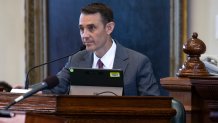
12:23 p.m. Osso asked Bangert about his knowledge of the investigation regarding Nate Paul at the time that Bangert went to the FBI. Osso also asked if Bangert ever tried to have a discussion with Paxton prior to going to the FBI, saying "So you did not take the time to hear his side of things before you went to law enforcement?" Bangert replied, "I disagree."
12:22 p.m. Osso questioned Bangert about the hiring of Brandon Cammack and the fact that Cammack was filing subpoenas by Michael Wynne. Bangert said that was the point that "crystalized a number of things" for him and other senior staffers about Paxton's involvement with Paul.
12:19 p.m. Osso: "Are you a Trump fan?" Bangert: "I voted for Donald Trump." Osso went on to ask if Bangert was a "staunch conservative" and if he was aware that the Trump administration issued an executive order a week later that mimicked the attitudes from Bangert's foreclosure opinion.
12:11 p.m. Osso showed the court a document from August 2020 relating to bankruptcy filings and foreclosure sales. He mentioned the automatic motions to stay that follow bankruptcy filings. Osso asked Bangert about his background with bankruptcy and foreclosure litigation, to which Bangert replied that it was not his area of expertise.
12:08 p.m. Osso asked Bangert why he did not keep copies of his text messages and why he deleted his texts. Bangert said he did not have access to his texts going back one year, and said the messages provided to the FBI were screenshotted in 2020.
12:07 p.m. Osso read out text messages from Paxton expressing gratitude to Bangert about the opinion and asked why Bangert did not make them known earlier.
12:06 p.m. Osso mentioned earlier testimony when Bangert said "Ken Paxton was acting like a man with a gun to his head."
12:04 p.m. Bangert said he was unsure why Paxton wanted to issue the foreclosure opinion at the time he was writing it. Osso mentioned communication between Paxton and Bangert while drafting the opinion, and asked Bangert if he disagreed with Paxton. Bangert said he was trying to understand Paxton's motives as his superior.
12:02 p.m. Osso asked Bangert if he lost his job or struggled to pay bills during the COVID-19 pandemic. Bangert said he did not. Osso continued to question Bangert about the economic impact of COVID-19 as it related to the foreclosure opinion.
12:01 p.m. Bangert said he did not know who the opinion was intended to benefit at the time he was writing it.
11:58 a.m. Bangert testified about an opinion relating to foreclosure sales in spite of a 10-person attendance limit during the COVID-19 pandemic under GA-28. Bangert directed Osso to page two of the document and pointed out the use of operative language.
11:57 a.m. Osso pointed out that it is standard practice for Paxton to sign a formal opinion. If Paxton was recused, Meteer would have signed the opinion.
11:54 a.m. Osso began asking about formal and informal opinions. Bangert said formal opinions are assigned KP numbers.
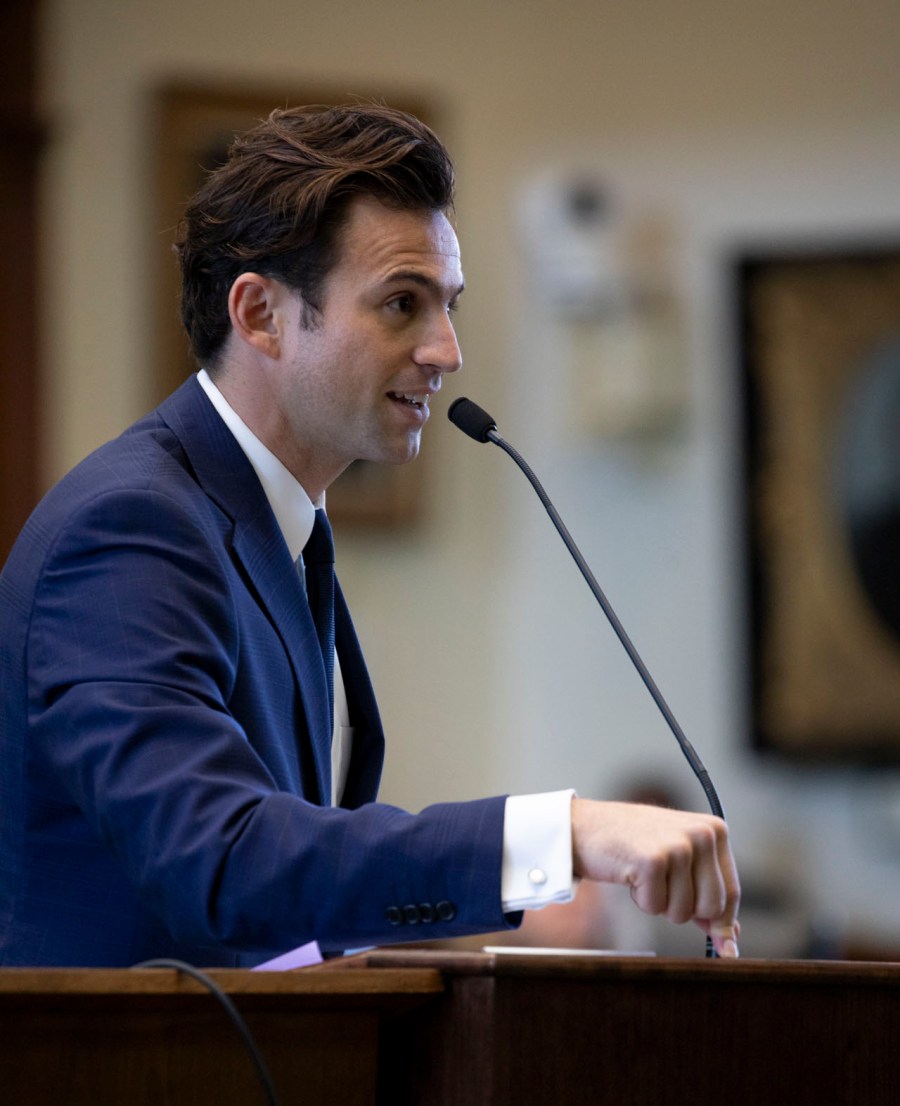
11:53 a.m. Osso also clarified that Paxton can intervene in a lawsuit if he thinks it is necessary. Bangert confirmed that the agency does have that authority.
11:52 a.m. Osso asked that Article 2, the aforementioned "informal" opinion signed by Bangert, be shown to the court.
11:51 a.m. Questioning continued about the involvement between Bangert, Vassar, and Paul. Osso asks why Bangert did not go to the FBI until September.
11:48 a.m. Osso asked if Bangert had personal knowledge that Paxton was entering into the Mitte litigation with Nate Paul. Bangert said he did.
11:47 a.m. Questioning continued regarding the Mitte Foundation. "The question does not make sense because I would not carry out illegal activity," Bangert said. "I did not have [Vassar] sign the opinion because I had a very bad feeling."
11:46 a.m. Osso said that Nate Paul did not receive any of the documents from any of the open records requests he filed. Bangert said that the agencies were not required to disclose the documents.
11:44 a.m. Osso: "Well, you didn't know everything, did you, Mr. Bangert?" Bangert: "I am not omniscient, so no." (Regarding the DPS open records request and subsequent ruling)
11:41 a.m. Osso suggested that the open records requests made by Nate Paul involved "unique circumstances."
11:37 a.m. In one request involving the Texas State Securities Board, the records were not given to Nate Paul. The second request involved the Texas DPS, and the department refused to rule. Osso began asking about a writ of mandamus that was filed in relation to the second request.
11:35 a.m. Osso asked Bangert about the open records requests made by Nate Paul and the statutory time required to make a ruling. Bangert could not recall the specific dates of the request or if it was made by Nate Paul or his attorneys. Osso clarified that there were three records requests, which Bangert called "two requests with a secondary request attached to the second." Osso also mentioned a request for reconsideration.
11:29 a.m. Osso referenced a document saying that Paxton took adverse action against employees after they made a good faith report to law enforcement. He asked Bangert if he had been fired himself. Bangert said he was "constructively discharged." Osso said that's not what he asked, and asked Bangert if Paxton said "You are no longer an employee of the Office of the Attorney General." Bangert said that Paxton never officially terminated his employment.
11:28 a.m. Osso asked Bangert about memorandums regarding his concern about the Mitte Foundation, the intervention, and other issues concerning Nate Paul, saying Bangert only wrote one memorandum. Bangert said he cannot recall if he wrote others.
11:25 a.m. Osso asked Bangert about the foreclosure letter and Bangert's attention to detail. He asks if it seems odd for someone to wait two months after an event happened to write a memorandum, meaning that Bangert waited until the date he met with the FBI to write a memorandum about the meeting.
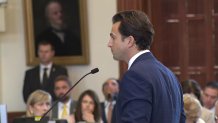
11:24 a.m. Osso mentioned two conversations involving Paxton that were mentioned during Bangert's testimony: the lunch meeting at Polvos and the phone call with Meteer before the Google meeting.
11:21 a.m. Osso began questioning Bangert about text messages between him and Paxton in June through August of 2020. The texts are admitted into evidence as Exhibit 1003.
11:16 a.m. Defense attorney Anthony Osso began cross-examination of Bangert.
11:15 a.m. Hardin passed the witness.
11:14 a.m. Hardin: "Have you noticed that [Ken Paxton] is not even here today?" Defense objected to Hardin's question and a tense moment followed.
11:13 a.m. Bangert explained how other whistleblowers were placed on administrative leave and mistreated after they went to law enforcement. Bangert called the experience "heartbreaking" because he believed in Ken Paxton and his office.
11:11 a.m. Bangert said while he was packing up his office following his resignation, Paxton entered his office, pacing and seeming agitated. According to Bangert, Paxton said, "The only reason you are in this office is because of me."
11:08 a.m. Paxton's reply to the group said: "Jeff, I am out of the office and received this text on very short notice. I am happy as always to address any issues or concerns. Please email with any issues or concerns so they can be addressed."
11:07 a.m. The text from Jeff Meteer to Ken Paxton, sent in a group text on Oct. 1, read: "General Paxton, yesterday each of the individuals on this text made a good faith report about violations of law by you to an appropriate law enforcement authority concerning your relationship and actions with Nate Paul. We request that you meet with us today... to discuss this matter."
11:06 a.m. The message was sent to the attorney general after senior staff made what Bangert called a "good faith report" to the FBI. Bangert said they wanted to end the unlawful use of the office's resources.
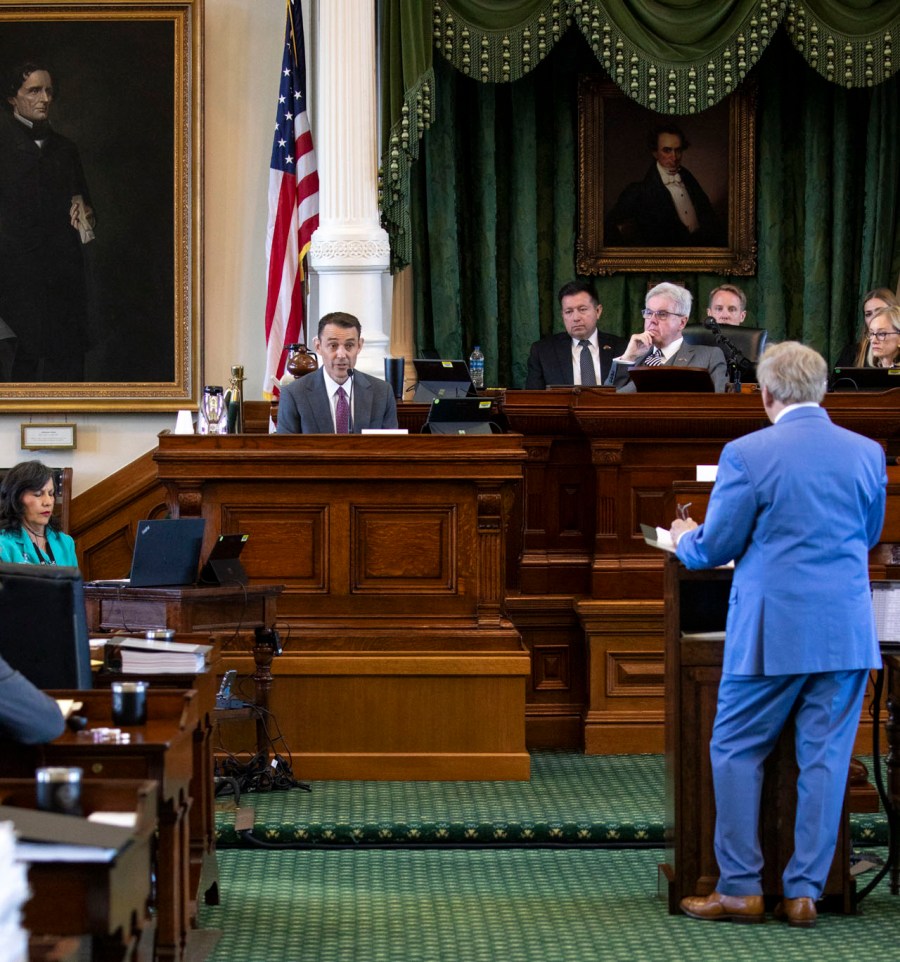
11:02 a.m. Court was called back in session. Hardin continued to question Bangert. He asked for another piece of evidence, a text message with Attorney General Paxton, to be shown to the court. The text was entered into evidence as Exhibit 571.
10:40 a.m. Dan Patrick ordered a 20-minute recess.
10:38 a.m. Bangert went on to discuss resigning from his position after the 2020 election. He said at the time of his resignation, his duties had been taken from him and he was an "employee in name only."
10:37 a.m. Bangert said he did not feel they were carrying out a mutiny, but rather they were protecting the state and the attorney general, and "signing [their] professional death warrant at the same time."
10:35 a.m. After reading the text messages, Bangert explained that he felt Paxton's behavior with Nate Paul was "improper."
10:28 a.m. A document was shown to the court, depicting a series of text messages from Sept. 29, 2020. Hardin asked Bangert to read the texts to the court.
10:27 a.m. Bangert: "I went to the FBI because I believed... that the Attorney General had abandoned his obligation to work on behalf of the people of Texas to work on behalf of the interests of one person, Nate Paul."
10:26 a.m. Seven senior staffers went to the FBI together, all of whom were interviewed together. The interview lasted several hours, Bangert said.
10:24 a.m. "We did not know what we did not know," Bangert said about the use of the Attorney General's office to further the interests of "private individuals." He went to the FBI because he said the agency has jurisdiction over "these kinds of matters."
10:23 a.m. Bangert said there was no doubt in his mind that Paxton was aware of the objections from senior staff about his relationship with Paul.
10:22 a.m. Bangert said he went to law enforcement because he felt there was nothing more they could do. He felt that, as senior staff, they had lost the ability to protect their principal.
10:21 a.m. "There was no road map to follow... our hand had been forced," Bangert said about going to the FBI.
10:19 a.m. "It was unconscionable in my view," Bangert said. "It became clear to me... that the Attorney General was prepared to harness the power of our office to further the interests of one individual."
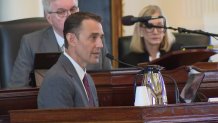
10:16 a.m. Hardin began asking about a meeting on September 29 before going to the FBI about Paxton's relationship with Nate Paul on September 30.
10:15 a.m. Hardin: "During that time were you still a supporter of the Attorney General?" Bangert: "Yes." Bangert explained that he had to walk the line between protecting the public, and the Constitution, and serving at the pleasure of the Attorney General.
10:13 a.m. "What would be your response to the suggestion that [you] were sitting around cooking up a mutiny against the attorney general?" Hardin asked. Bangert responded that they were trying to protect Paxton and repeatedly warned him about Paul.
10:11 a.m. "We had been following this pattern of Nate Paul and his issues metastasizing throughout the agency," Bangert said.
10:07 a.m. Bangert said the office of the attorney general wanted to investigate a warrant to search Paul's property that was allegedly improperly obtained as well as allegations of a government conspiracy against Paul.
10:06 a.m. "My concern based on that occurrence was substantially heightened," Bangert said, adding that his concern was because Paxton's focus was on Nate Paul instead of the intense phase of the Google litigation.
10:04 a.m. Defense continued to object to Hardin's line of questioning about the phone call on the grounds that it was hearsay. Lt. Gov. Patrick continued to overrule the objections.
10:02 a.m. "We went right up to the bell. We were almost late for the [Google meeting]," Bangert said about the length of the Meteer's call with Paxton regarding Nate Paul.
10:00 a.m. Bangert recalled witnessing a phone call between Meteer and Paxton regarding Nate Paul and obtaining outside counsel. The phone call took place prior to an important meeting regarding ongoing Google litigation. The call with Paxton, which "continued for some time," was primarily about Nate Paul rather than the Google lawsuit.
9:56 a.m. Bangert said Paul alleged that he was being treated unfairly by the government. Bangert said he saw no evidence to indicate that was true.
9:54 a.m. In August and September, it became an issue of "urgent concern" for Bangert and others on the senior leadership team regarding involvement with Nate Paul. Bangert mentioned his work on an open records request and his work with the Mitte Foundation. He called some of his dealings with Paul "frivolous at best" and said he was "exceptionally concerned."
9:52 a.m. Disagreement continued between Hardin and defense attorneys over interrupting and objecting before a question had been asked.
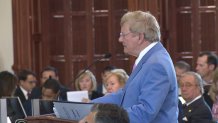
9:50 a.m. "I am going to be forced to hold you in contempt soon... just kidding." Patrick to Hardin after he mistakenly referred to him as "senator."
9:47 a.m. Bangert said the reader of an informal opinion should evaluate it "for its persuasive value."
9:46 a.m. Hardin asked the court to instruct the defense to wait until he was finished asking a question before objecting. Patrick then asked the defense to wait until Hardin finished speaking before objecting because the court reporter could not take notes if they were "talking over each other."
9:43 a.m. "At this time, we were dealing with an unusual influx in requests for advice," Bangert said of his experience dealing with Nate Paul and his lawyers.
9:41 a.m. Bangert said he added the note at the end of the opinion because it did not go through the normal, formal procedure, or "rigorous process of review" that is normally given to such opinions.
9:38 a.m. A note Bangert added at the end of the opinion said: "Please note: this letter is not a formal attorney general opinion under Section 402.045 of Texas Government Code." The note clarifies that the opinion is only to be used as informal legal guidance. Bangert likened the informal nature of the opinion to the practice in Texas of issuing published and unpublished opinions.
9:36 a.m. Hardin asked to show Exhibit 115 to the court. Patrick and Hardin clarify that the exhibit had already been admitted into evidence. The exhibit was an opinion concerning foreclosures which Bangert says he completed and signed.
9:35 a.m. Hardin began asking Bangert about the "midnight opinion." He mentioned Section 4 of the Government Code and the distinction between a formal and informal opinion.
9:32 a.m. Bangert said "We were giving far more time to Nate Paul... than we should have given the importance of those issues," when asked how much time and resources were devoted to Nate Paul as opposed to the other lawsuits being worked on at the time.
9:31 a.m. Hardin began asking Bangert about the lawsuits that he was working on at the time of the lunch. Bangert mentions a Google lawsuit (that he believed was still pending), election-related lawsuits, and COVID-19-related lawsuits.
9:29 a.m. Bangert said he described the lunch meeting to a colleague as "one of the craziest things [he] has ever seen." He used the Latin term "sui generis," meaning "one of a kind," to describe the meeting, adding that he had never seen anything like it.
9:25 a.m. Bangert explained that Paul gave a list of complaints at the lunch meeting, which Hardin described as "pleading his case" to Bangert. Bangert said the lunch lasted between 30 and 35 minutes. Bangert said he got the impression that he was summoned to the lunch meeting so he would get on board with the agency's involvement with the Mitte Foundation.
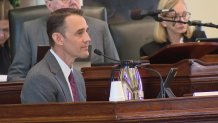
9:24 a.m. Hardin asked Bangert if Paxton ever expressed disagreement with anything Paul said at the lunch meeting. Bangert replied, "No."
9:22 a.m. Hardin asked Bangert to describe the lunch. Bangert described the restaurant and explained that Nate Paul did the majority of the talking at the lunch meeting.
9:20 a.m. Bangert said after his meeting with Paxton about the state's intervention, Paxton returned to his office for roughly 15 minutes after which he granted Bangert permission to meet with Paul without his attorneys present.
9:18 a.m. Bangert recalled meeting with both Mateer and Paxton on separate occasions regarding his ethical reservations about the lawsuit in which the state had intervened.
9:16 a.m. Hardin asked Bangert about a lunch he attended with Ken Paxton, Drew Wicker, and Nate Paul. The lunch took place in mid-June, after the agency's initial involvement with the Mitte Foundation and the aforementioned intervention. Bangert recalled that Paxton drove the group to Paul's office before going to lunch at Polvos in Austin.
9:14 a.m. Hardin began questioning Bangert.
9:13 a.m. Bangert entered the courtroom.
9:10 a.m. Court called to order. Hardin told Patrick that he did not have notes or evidence from Ryan Bangert that had not been turned over to the court.
9:01 a.m. Prosecutors and defense attorneys approached the bench to speak with Lt. Gov. Dan Patrick before court resumed for the day.
9:00 a.m. Court began with a prayer led by Sen. Juan "Chuy" Hinojosa from District 20.
8:59 a.m. Ken Paxton, who is not required to attend all of the proceedings, was not seen in the courtroom Thursday morning.
8:58 a.m. The Senate was called to session and Lt. Gov. Dan Patrick entered the chamber. The jury was then called into the chamber.
WHY IS PAXTON ON TRIAL?
The Republican-led Texas House of Representatives voted overwhelmingly in May to impeach the attorney general, largely based on his former deputies' claims that he used his power to help a wealthy donor who reciprocated with favors including hiring a woman with whom Paxton had an extramarital affair. The 20 articles of impeachment brought forth by the Texas House include allegations of abuse of public trust, unfitness for office and bribery. The Texas Senate is holding four of the articles in abeyance because they are largely related to the 2015 criminal charges where Paxton has been accused of felony securities fraud. Paxton has pleaded not guilty in that case but so far there has been no trial.
If convicted in the impeachment, Paxton would be removed as attorney general and could be barred from holding future elected office in the state.
THE LATEST IN THE KEN PAXTON IMPEACHMENT TRIAL
Below are some of the headlines from the historic nine-day impeachment trial.
KEN PAXTON IMPEACHMENT TRIAL
What to know about the historic impeachment of Texas Attorney General Ken Paxton.

